Article V Part 2
This course is part 2 of a two-part series on the principles and purpose of Article V of the Constitution.
In this course we will review the founders concerns of a future convention to amend the Constitution and also the modern “interpretation” of this Article created by decades of congressional studies.

 Download
Download